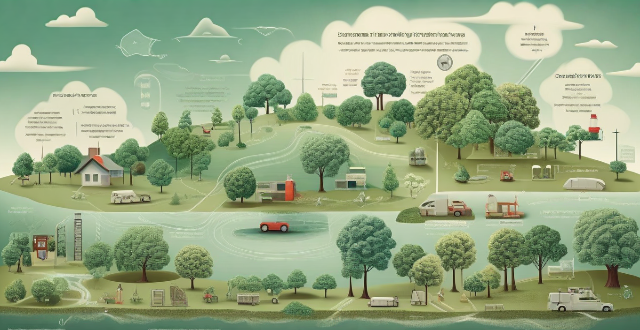Resources Loss

What are the ethical implications of climate loss and damage ?
The ethical implications of climate loss and damage are multifaceted, involving issues of justice, responsibility, human rights, and intergenerational equity. Those who have contributed the least to climate change are often disproportionately affected by its consequences, raising questions about fairness and justice. Responsibility and accountability for addressing these impacts are also crucial, with industrialized nations having historically emitted more greenhouse gases and generally having more resources to invest in climate action than poorer ones. Climate loss and damage pose serious threats to human rights, including the right to life, health, food, water, and housing. Intergenerational equity is also a significant consideration, as current generations must not deprive future generations of the ability to meet their own needs by depleting natural resources and altering the climate system. Addressing these challenges requires global cooperation and a commitment to creating a more equitable and sustainable world for all current and future inhabitants of our planet.

How does climate loss and damage affect vulnerable communities ?
The text discusses the impact of climate loss and damage on vulnerable communities. It highlights that these impacts are multifaceted and can be categorized into various sectors including health, agriculture, infrastructure, and social stability. The health impact includes direct and indirect risks from extreme weather events and disruptions to food and water security. The agricultural impact involves crop failures due to changes in precipitation and temperature patterns, leading to loss of livelihoods and increased food prices. Soil degradation also reduces land productivity. Infrastructure damage includes coastal erosion and inland flooding, causing property loss, disruption of services, and repair costs. Social stability is affected by displacement due to environmental changes and economic strain from adapting to climate change. The conclusion emphasizes that addressing these challenges requires global cooperation and targeted support to build resilience and protect those most at risk.

What are the long-term consequences of climate loss and damage ?
The article discusses the long-term consequences of climate loss and damage, including rising sea levels, extreme weather events, loss of biodiversity, impact on agriculture, disruption of industries, costs of mitigation and adaptation, health risks, displacement and migration, and impact on culture and heritage. It highlights the need for a global effort to reduce greenhouse gas emissions and adapt to the changing climate in order to create a more sustainable future.

Do immigration policies influence language preservation or loss within communities ?
Immigration policies can significantly affect language preservation and loss in communities by changing demographics, shaping language education, community support, and intergenerational transmission. Open policies may increase diversity, while restrictive ones can lead to language loss.

How does climate change influence the distribution of fishing resources and the livelihoods of fishing communities ?
Climate change affects fishing resources and livelihoods by altering water temperature, ocean acidity, precipitation patterns, sea level, and causing economic impacts on fishing communities.

What role do governments play in addressing climate loss and damage ?
Governments play a critical role in addressing climate loss and damage through legislation and policy making, research and development, education and awareness, and international cooperation. They can enact laws that regulate emissions and protect natural resources, develop policies that encourage sustainable practices, fund research into new technologies for reducing greenhouse gas emissions, launch public education campaigns to raise awareness about climate change, and work together through international agreements and collaborative projects to share knowledge and resources. By taking these actions, governments can help mitigate the effects of climate change and protect our planet for future generations.

Can organic food help with weight loss ?
Organic food may aid weight loss by reducing exposure to harmful chemicals, offering higher nutrient content, having lower calorie density, and improving digestion. Incorporating organic options slowly, choosing locally grown produce, reading labels carefully, planning meals, and including protein sources can support a healthy eating plan conducive to weight loss.

Can fitness trackers help me achieve my weight loss goals ?
Fitness trackers can support weight loss by tracking steps, heart rate, sleep, and calories. They provide motivation, accountability, and data for decision making. However, they have limitations such as overreliance on technology and accuracy concerns. It's important to use them wisely and in conjunction with other healthy habits for effective weight loss.

Can strength training help with weight loss ?
Strength training, involving the use of resistance to induce muscular contraction and build strength, can significantly contribute to weight loss by increasing metabolic rate, boosting post-exercise oxygen consumption (EPOC), improving body composition, and enhancing appetite control. Incorporating strength training into your routine, starting slowly and focusing on compound movements while staying consistent, can help achieve weight loss goals.

Can yoga help with weight loss ?
Yoga can be a valuable addition to a weight loss program due to its ability to improve muscle tone, increase flexibility, reduce stress levels, and promote mindful eating habits. Incorporating yoga into your routine along with other forms of exercise and healthy lifestyle habits can help you achieve your weight loss goals and improve overall health and well-being.

How do climate change and biodiversity loss intersect ?
Climate change and biodiversity loss are interconnected issues that impact each other significantly. Climate change can lead to habitat loss, altered migration patterns, and changes in prey-predator relationships, all of which can result in reduced populations or even extinction for some species. On the other hand, biodiversity loss can reduce carbon sequestration, compromise soil health and water regulation, and impair ecosystem services that help mitigate climate change. Urgent action is needed from all stakeholders to address these challenges and protect our planet's fragile ecosystems.

Does lifting weights help with weight loss ?
Weight loss is a common goal for many people, and weightlifting is one of the most popular methods. However, does lifting weights help with weight loss? This article explores the benefits and drawbacks of weightlifting as a means of weight loss. One of the main benefits of weightlifting is muscle growth, which can lead to an increase in metabolism and help with weight loss. In addition, weightlifting can also help with fat burning and improved cardiovascular health. However, there are also some potential drawbacks to weightlifting, including high initial costs, potential injuries, and a significant time commitment. If you are interested in trying weightlifting as a way to lose weight, make sure you do your research and find a program that fits your needs and lifestyle.

What is the relationship between climate change and loss of habitat for endangered species ?
Climate change is causing significant changes in ecosystems around the world, leading to the loss of habitat for endangered species. Rising temperatures, changing precipitation patterns, sea level rise, and extreme weather events are all factors that contribute to this loss. Endangered species are particularly vulnerable to these changes due to their small populations and limited ranges. Examples of endangered species affected by climate change include polar bears, giant pandas, leatherback turtles, and amphibians. It is essential that we take action to protect these species and their habitats, including reducing greenhouse gas emissions, conserving natural habitats, and developing adaptation strategies.

Can eating a healthy diet help with weight loss ?
Eating a healthy diet is crucial for weight loss and overall health. A balanced meal plan can increase satiety, improve nutrient intake, reduce cravings, and enhance digestion. To create a healthy meal plan, focus on whole foods, control portion sizes, choose healthy fats, stay hydrated, and plan ahead. By following these tips, you can achieve your weight loss goals while nourishing your body with essential nutrients.

What are the potential economic benefits of mining resources on other planets ?
The article discusses the potential economic benefits of mining resources on other planets, including increased availability of resources, creation of new jobs, advancements in technology, stimulation of economic growth, diversification of energy sources, and expansion of human habitat.

What are some common misconceptions about weight loss and exercise ?
This text discusses common misconceptions about weight loss and exercise, including the idea that skipping meals leads to weight loss, spot reduction is effective, more exercise equals more weight loss, weight training makes women bulky, cardio is the best way to lose weight, fad diets offer quick fixes, all calories are created equal, and you can out-exercise a bad diet. It emphasizes the importance of understanding these misconceptions to adopt healthier habits and set realistic goals for improved health and wellness.